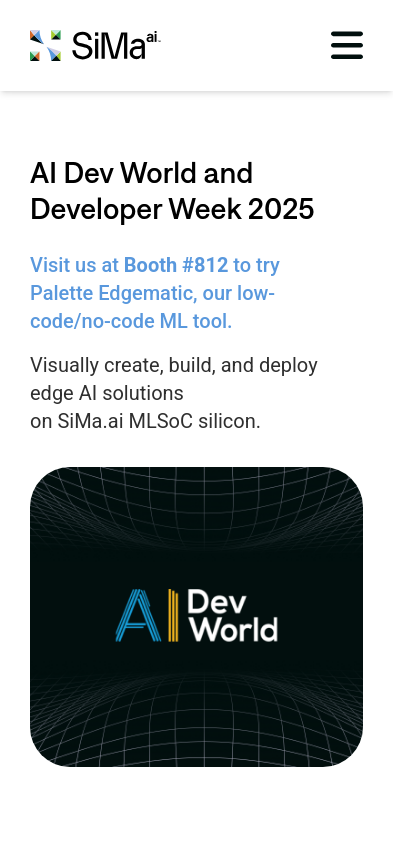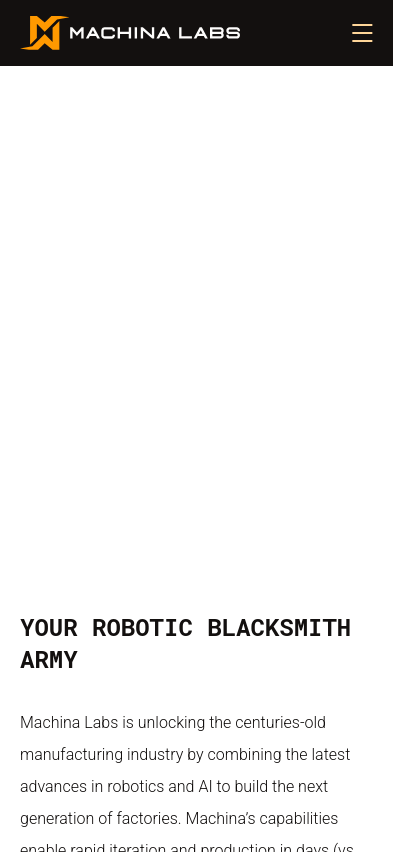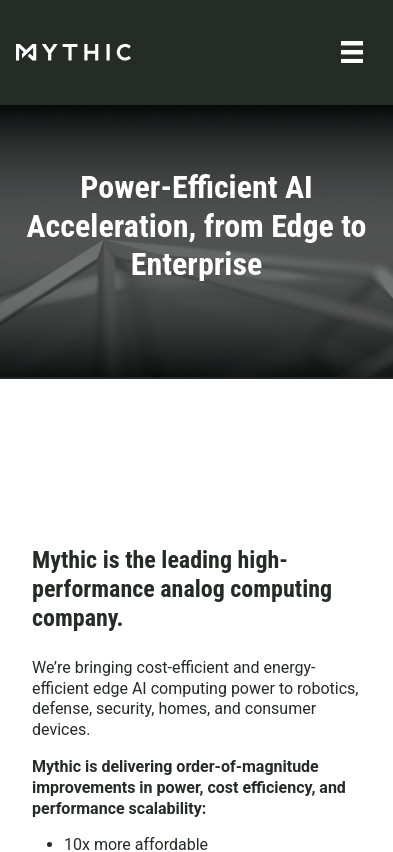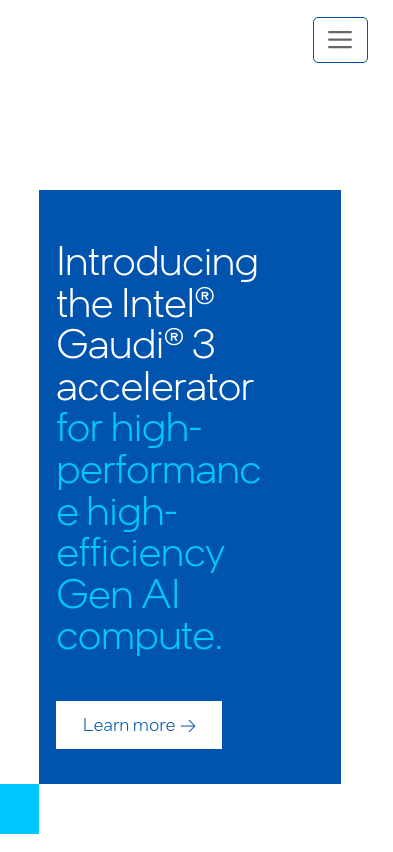⚡ZurzAI.com⚡
Companies Similar to Enfabrica
Faculty

The article discusses safe, large-scale AI deployment in the NHS, focusing on forecasting hospital demand, enhancing network stability with machine learning, and accelerating technological advancements.
Faculty's key focus area is the development and deployment of artificial intelligence (AI) technologies across various industries. This entails providing tailor-made AI services and talent across sectors such as energy, infrastructure, financial services, education, public services, defence, and healthcare. The company positions itself as a key player in utilizing frontier AI to enhance decision-making and operational efficiencies.
Faculty's unique value proposition and strategic advantage lie in its comprehensive approach to integrating AI solutions into real-world applications, particularly by:
- Offering customized AI development, strategy, and infrastructure services to address specific business needs across numerous industry verticals.
- Engaging in projects that reportedly maximize the positive impact of AI, such as improving network stability in energy systems or streamlining operations within public services and defence sectors.
To deliver on their value proposition, Faculty employs various approaches:
- Applying advanced AI models in practical contexts, such as financial services, where they focus on deriving value from textual data. This helps clients better interpret vast amounts of information for informed decision-making.
- Providing optimization solutions for infrastructure projects, showcasing AI as a critical enabler in environments like the UK’s regulated infrastructure.
- Developing AI solutions to predict and manage demand, as demonstrated by their involvement with the National Health Service (NHS) in forecasting hospital requirements during the COVID-19 pandemic.
- Partnering with educational organizations to ensure the safe deployment of impactful AI tools in classroom settings.
The company outlines its intent to responsibly leverage AI in sectors like defence and electricity, emphasizing the promise of increased efficiency and enhanced operational outcomes while maintaining a commitment to ethics and safety in AI implementation. Through these strategic pursuits, Faculty aims to position itself as a vital contributor to the development and application of AI across both private and public spheres.
SiMa.ai

SiMa.ai creates chips for AI workloads at the edge, offering a "software-centric" platform for multimodal applications. SiMa.ai™ is a machine learning company delivering the industry’s first software-centric purpose-built MLSoC™ platform for effortless ML deployment and scaling at the embedded edge.
About | About | News | Leadership | Leadership | About
SiMa.ai is primarily focused on revolutionizing machine learning (ML) at the embedded edge. Their core offering is their Machine Learning System on Chip (MLSoC™), a purpose-built platform aimed at addressing varied computer vision challenges across multiple industry sectors, such as automotive, industrial, healthcare, drones, smart vision and retail, and the government sector.
Key Focus Area: The key focus of SiMa.ai is making ML "effortless" across diverse edge applications by providing high-performance, low-power solutions integrated within MLSoC™. With a push-button software experience, SiMa.ai targets complex scenarios in areas like autonomous vehicles, industrial automation, healthcare data processing, and smart retail, where energy efficiency and real-time processing are critical.
Unique Value Proposition and Strategic Advantage: SiMa.ai’s unique value proposition lies in their MLSoC™—a comprehensive, single-chip solution that supports a broad spectrum of models, including CNNs, Transformers, and Generative AI. Their strategic advantages include:
- Performance and Power Efficiency: Offering up to 10x better performance per watt compared to competitors, SiMa.ai addresses the industry's need for high throughput with reduced power consumption.
- Software-First Approach: By focusing on software-centric design, SiMa.ai allows for seamless, rapid deployment and iteration of ML models, making it user-friendly and adaptable for developers.
- Scalability and Versatility: Their platform accommodates future and legacy ML models, expanding its usability across multiple use cases and industries.
Delivering on Value Proposition: SiMa.ai operationalizes its value proposition through:
-
MLSoC Family and Board Solutions: Their offerings include the MLSoC Modalix, with configurations tailored for different performance needs (25 to 200 TOPS). This ensures adaptability to market demands for smart vision systems, drones, industrial automation, and smart cities.
-
Palette Software Platform: A dedicated software suite that simplifies the development, testing, and deployment of ML solutions across edge applications. This platform enables integration of custom ML solutions through a no-code/low-code approach, making it accessible and reducing the technical barrier for businesses.
-
Effortless Integration and Deployment: SiMa.ai’s solutions provide plug-and-play integration and are designed to be versatile enough to support multiple sensors and devices, all while ensuring secure data handling with built-in privacy features.
-
Strategic Partnerships: Collaborations with industry leaders like Synopsys and TRUMPF enhance SiMa.ai’s offerings in specific sectors like automotive and industrial applications, further cementing their foothold in these industries.
-
Customer-Centric Approach: Engaging actively with clients in over 50 leading companies, they strive for meticulous adaptation of their solutions to meet specific client needs.
In conclusion, SiMa.ai positions itself as a transformative player in the embedded edge ML market with its scalable, energy-efficient, and user-friendly approach ready to tackle complex computing challenges with speed and simplicity.
MicroAI

MicroAI provides AI-focused solutions for various industries, offering products like Machine Intelligence, Smart Connectivity, Security and Monitoring, Digital Factory, Launchpad, AIStudio, and Gen AI Knowledge Management primarily focusing on AI capabilities, telecom solutions, cybersecurity, manufacturing optimization, and knowledge management systems.
About | About | About | About | About | About | About | About | About | About | About | About | About
MicroAI focuses on providing advanced intelligence solutions for various industries by enhancing machine and device performance through Embedded/Edge AI and Machine Learning technologies. The company targets sectors like manufacturing, telecom, automotive, finance, and infrastructure, offering solutions that extend from machine intelligence to various facets of IT and OT asset optimization.
Key Focus Area: MicroAI's key focus is on optimizing the performance, reliability, and security of machines and devices across industries. By embedding AI and machine learning algorithms at the endpoint, MicroAI aims to make machines more transparent, providing real-time insights into their operations.
Unique Value Proposition and Strategic Advantage: MicroAI's value proposition lies in its edge and embedded AI solutions, which deliver:
- Enhanced machine transparency and performance insights.
- Predictive intelligence that minimizes downtime and maximizes output.
- A reduction in operational and maintenance costs through predictive maintenance.
Strategic advantages include:
- Providing a unified AI-enabled platform that integrates seamlessly with existing machine assets.
- Offering edge AI capabilities that reduce cloud dependency and improve data processing efficiency and security.
- Advancing zero-trust cybersecurity frameworks that protect against sophisticated cyber threats directly at the endpoint level.
Delivery on Value Proposition: MicroAI delivers its value proposition through several key methods:
-
Machine Intelligence Platform: This platform enables deeper insights into machine performance through advanced embedded AI technologies. It includes features like endpoint-based performance monitoring, predictive analytics, and intelligent workflows for operational automation.
-
Smart Connectivity: The Telecom-focused solutions provide orchestration capabilities that optimize network quality of service, create new revenue streams, and increase system sustainability. Machine learning is used to enhance device lifecycle management and accelerate market entry.
-
Security and Monitoring: Applying AI for cybersecurity, MicroAI offers rapid threat detection and mitigation strategies that drive a zero-trust security model, ensuring robust protection against cyber-attacks.
-
Digital Factory and AIStudio: These integrated solutions cater to manufacturing needs by revolutionizing factory performance, enabling predictive maintenance, and improving overall equipment effectiveness (OEE), all through AI visualization and tuning.
-
Gen AI Knowledge Management: This system utilizes generative AI to efficiently manage and analyze organizational knowledge, transforming data into actionable insights.
By consolidating these technologies into a coherent AI-enabled ecosystem, MicroAI claims to deliver reduced operational complexity and costs, improved performance metrics, and innovative solutions tailored to specific industry needs.
Machina Labs, Inc

Machina Labs specializes in robotics and AI, creating smart factories for automated component manufacturing across industries like aerospace, automotive, and consumer products.
Machina Labs is focused on transforming the manufacturing sector through the integration of artificial intelligence (AI) and robotics. Their main offering, dubbed the Robotic Craftsman, is a manufacturing platform that allows for agile production employing 7-axis robots, autonomous sheet loading, and advanced AI process models. This platform offers several operations including Roboforming™, Scanning, Trimming and Drilling, and Finishing, with plans to integrate more capabilities in the future.
Key Operations and Specifications:
- Roboforming™: Leverages robotics and AI to shape metals quickly and with precision. It’s capable of handling parts up to 12 feet long and forming metal up to ¼ inch thick.
- Scanning: Utilizes a robot-mounted laser for 3D mapping to ensure manufacturing accuracy.
- Trimming and Drilling: Autonomous manipulation of cutting tools guided by precise data acquisition from scanning.
- Finishing: Options for both manual and automated finishing to achieve desired surface qualities.
Industries and Applications: Machina Labs supports several sectors, including:
- Aerospace and Defense: Rapid manufacturing that helps stakeholders like NASA and the U.S. Government.
- Automotive, Industrial, and Consumer Goods: Involves ranging from the creation of precision aero surfaces to the customization of consumer appliances.
- Composites: The Roboforming technology significantly reduces time and materials in tooling and manufacture.
Engagement and Business Models: Machina Labs offers flexible business models designed to enhance collaboration:
- Dev Suite: For initial prototype testing and concept validations.
- On Prem: Allows systems to be deployed at clients’ facilities maximizing security and speed.
- Elastic Factory: A scalable, software-defined production facility that adjusts to varying production needs without physical tooling changes.
Team and Career Opportunities: The company is backed by a team comprising experts from various fields like robotics, software engineering, and materials science. Machina Labs emphasizes a culture of diversity, inclusion, and iterative innovation.
Anvil Program: Machina Labs has ventured into automotive design with Anvil, that enables custom design and manufacturing of vehicles using the company's Roboforming platform. Initial models are based on the Ford F-150, with further extensions envisaged.
Recent Developments and Achievements:
- Machina Labs raised $32 million in their Series B funding, co-led by NVentures and Innovation Endeavors, to cater to increasing demand and R&D efforts.
- The introduction of the Deployable System, a portable version of their technology, makes it possible for manufacturers to utilize Roboforming in varied settings.
- Contracts with the U.S. Air Force and appearances on platforms like Bloomberg underline Machina’s influence in both defense and the consumer sectors.
Privacy and User Engagement: Machina Labs values customer privacy, offering clear outlines for data collection and use. Users can interact with the company through various channels and platforms, signifying a commitment to transparency and responsiveness to user needs.
In conclusion, Machina Labs is actively reshaping the landscape of manufacturing by providing systems that combine the precision of robotics with the adaptive potential of AI. This approach offers unprecedented speed and adaptability, catering to a diverse range of industries and applications.
Arcanna.ai

Arcanna.ai develops a decision intelligence platform aimed at advancing autonomous decision-making in cybersecurity.
Jobs | Jobs | Leadership | About | Leadership | About
Arcanna.ai operates as a cybersecurity firm with a specialty in leveraging artificial intelligence (AI) to enhance Security Operations Center (SOC) dynamics. Positioned as a "Cool Vendor" by Gartner, the company offers a decision intelligence platform aimed at empowering SOC analysts to improve decision-making processes within cybersecurity protocols.
Key Features and Offerings:
-
Decision Intelligence Platform: Arcanna.ai's primary offering aids SOC and Network Operations Center (NOC) professionals by harnessing AI for streamlined decision-making. This platform is designed to be agnostic, compatible with various tools and workflows used by security analysts.
-
Human-AI Collaboration: The platform incorporates predictive and generative AI models that enable enhanced incident response and threat handling. It supports a human-in-the-loop approach, ensuring that decision-making processes are informed by both AI insights and human judgment.
-
Integration and Scalability: Arcanna.ai integrates effortlessly with existing SOC tools such as SIEM systems (like Splunk and IBM QRadar) and SOAR platforms. This capability enhances the capacity for better decision-making without the need for extensive changes to existing infrastructure.
-
Feedback Loop for Continuous Improvement: The platform leverages deep learning to evolve continuously based on user feedback, ensuring the AI models are always aligned with current threats and operations.
Organizational Background:
-
Founding and Evolution: Established in 2019, Arcanna.ai originated from the need to address common SOC challenges such as information overload and analyst fatigue. The platform has undergone extensive research and development to evolve into an AI-powered solution focused on enhancing analytical capabilities and decision-making efficiencies within cybersecurity.
-
Team Composition: The company is led by Peter Ruta as CEO, alongside a diverse team of professionals experienced in security operations and AI technologies, working together to push the boundaries of decision intelligence in cybersecurity.
Resources and Support:
-
Educational Materials: Arcanna.ai provides a range of resources including whitepapers, datasheets, and webinars that elaborate on the importance and application of AI in cybersecurity, enhancing the knowledge base of its users.
-
Customer Engagement: The company encourages engagement through contact forms for inquiries, demo requests, and feedback collection, reinforcing its commitment to customer interaction and support.
-
Success Stories: Testimonials and use case stories reveal positive client experiences and successful integrations, highlighting Arcanna.ai's role in enhancing SOC capabilities through AI.
Use Cases and Integration Partnerships:
-
Collaboration with Core42 and Algosystems: Arcanna.ai has formed partnerships with organizations like Core42 to improve integrated cybersecurity services, and Algosystems, focusing on comprehensive cybersecurity solutions through AI.
-
Use Case Examples: The platform's capabilities in integration with systems like IBM QRadar and Chronicle underline its potential to streamline security operations, reduce SOC analysts' burnout, and ensure solid defense mechanisms.
News and Developments:
- Funding and Growth: Arcanna.ai secured a $3.5M investment to expand its decision intelligence platform, reflecting its ongoing growth and commitment to advancing AI capabilities in cybersecurity.
Challenges Addressed:
- Alert Fatigue and Resource Management: Arcanna.ai directly tackles critical issues in SOC management, such as alert fatigue and the overwhelming volume of alerts, providing tools for more efficient triage and decision-making processes.
Overall, Arcanna.ai operates as a forward-thinking entity in the cybersecurity domain, advocating for a synergistic relationship between human expertise and AI capabilities to enhance decision-making and operational efficiency within SOCs.
Apera AI

Apera AI specializes in developing 4D vision technology for industrial robotics to improve the reliability and productivity of vision-guided robotics. Their technology includes products like Apera Vue robotic vision software and Forge Lab AI simulation.
Apera AI is an organization focused on enhancing factory productivity by providing robots with advanced vision capabilities akin to human vision. Their core offerings include AI-driven robotic vision software, particularly through products like Vue software, 4D Vision technology, and Forge Lab AI training & simulation environments, each designed to improve the reliability and productivity of vision-guided robotics in various industrial applications.
Main Technologies and Products:
-
Apera Vue Software: A robust AI-driven robotic vision system empowering robots with advanced object recognition and path planning capabilities. The Vue software is noted for its ability to operate in diverse lighting conditions and its compatibility with major robot brands, providing enhanced performance in tasks such as bin picking, assembly, and machine tending.
-
4D Vision Technology: Uses AI to create a 3D understanding from 2D camera inputs, enabling robots to interact with their environment with a high level of precision and reliability. It is designed to function in all lighting conditions without the need for special equipment.
-
Forge Lab: A web-based AI training and simulation platform facilitating the setup and testing of vision-guided robotic cells. This platform aims to minimize risk and time in developing complex robotic systems without the need for hardware, showcasing Apera AI's commitment to making automation accessible and efficient.
Applications and Industries:
Apera AI's technologies are applicable across various industries including automotive, medical devices, life sciences, and metal fabrication. Key applications of their vision-guided robotics include:
-
Bin Picking: A complex task made efficient with AI-powered vision, allowing for fast and accurate sorting and handling of diverse objects, including clear and shiny items.
-
Robotic Assembly and Guidance: Automates complex assembly processes and provides precise guidance for robotic operations, improving productivity and reducing manual intervention.
-
Machine Tending: Automates the feeding and removal of parts in CNC or laser marking machines, optimizing labor usage and ensuring consistent productivity.
-
Sorting and Packaging: Assists in sorting delicate and similar-looking objects with accuracy, enhancing speed and precision in packaging operations.
Strategic Partnerships and Ecosystem:
Apera AI collaborates with a network of robotics partners, integrators, and distributors, broadening its reach and ensuring robust support for implementation. The compatibility of Vue software with various robot brands, such as ABB, FANUC, and Universal Robots, supports diverse applications across different industries.
Company Philosophy and Culture:
-
Innovation and Expertise: Apera AI is led by a team with deep expertise in AI, machine learning, and robotics, dedicated to driving improvements in manufacturing.
-
Technological Impact and Investment in People: Encourages a culture of scientific inquiry and real-world problem-solving, valuing diverse perspectives and continuous learning.
Customer Engagement and Success Stories:
Notable projects, such as those with Linamar Corporation and Flex-N-Gate, illustrate Apera AI's effective integration of robotic vision solutions leading to significant enhancements in production efficiency and quality standards.
Growth and Career Opportunities:
Apera AI is rapidly expanding in the AI and automation sector and invites individuals passionate about cutting-edge technology and problem-solving to join their team, offering roles that contribute directly to pioneering industrial automation solutions.
Overall, Apera AI is positioning itself as a significant facilitator of advanced robotics in manufacturing, with a distinct focus on leveraging AI for revolutionary improvements in reliability, flexibility, and productivity across global industries.
Mythic

AI hardware solution focusing on edge computing to enable high-performance AI inference in low-power devices. Mythic focuses on AI hardware for edge computing to enable high-performance AI inference in low-power devices.
-
Key Focus Area: Mythic concentrates on providing power-efficient AI acceleration particularly at the edge, as well as on cloud platforms. Their emphasis is on enabling high-performance AI inference through their specialized analog computing technology, which is effective in applications that suffer from limitations due to high power consumption and computational inefficiency commonly associated with digital processors. Their products serve diverse markets such as intelligent machines, smart homes, AR/VR, drones, aerospace, and smarter cities.
-
Unique Value Proposition and Strategic Advantage:
- Analog Compute-in-Memory Technology: Mythic’s proprietary analog compute-in-memory architecture is at the core of their competitive advantage. Unlike traditional digital computing, their solutions store AI parameters within the processor, doing away with memory bottlenecks, thereby reducing energy consumption and enhancing speed.
- Power and Cost Efficiency: Their analog processors are noted for delivering similar computing capability as a GPU with as little as one-tenth of the power consumption and at much lower costs. This is positioned as a strategic advantage over digital counterparts, which face operational limits due to energy requirements and costs.
- Scalability and Flexibility: The design of the Mythic AMP allows deployments from small edge devices to data centers, offering flexibility and future-proofing for developers as demands for performance may increase.
- Delivery on Value Proposition:
- Product Offerings: Mythic’s key products, such as the M1076 Analog Matrix Processor, MM1076 M.2 M Key Card, and ME1076 M.2 A+E Key Card, integrate their analog computing technology into various applications that demand AI inference with low power consumption and high performance.
- Software Ecosystem Integration: They ensure compatibility with existing AI training frameworks like PyTorch and TensorFlow, simplifying integration with existing AI workflows. Their software stack optimizes and compiles neural networks, enhancing ease of adoption and performance.
- Market and Application Focus: Mythic targets diverse sectors including smarter cities for surveillance, intelligent machines for manufacturing efficiency, AR/VR environments for interactive experiences, and drones for secure data processing. By focusing on how their technology can be integrated seamlessly into these applications, they address industry-specific challenges such as latency reduction, cost efficiency, and system resilience.
Overall, Mythic positions its technology as a game changer for AI infrastructure, providing an efficient alternative to the incumbent digital AI processing methods, with a particular focus on reducing energy consumption while maintaining high computational performance.
Habana

A leader in chip and semiconductor technology. A company that provides deep learning acceleration hardware and software that helps with high-performance computing and data center workloads.
About | About | About | About | About | About | About | About | About | About | About | About | News
Habana Labs, owned by Intel, primarily focuses on developing advanced AI accelerators, notably the Intel® Gaudi® series. These products are dedicated to enhancing performance and efficiency in AI computing, particularly for deep learning and generative AI applications.
Key Focus Area:
- The company's main focus lies in high-performance, cost-efficient AI accelerators tailored for training and inference of deep learning models. Their products are significant for industries including autonomous vehicles, healthcare, fintech, and retail that rely heavily on AI functionalities.
Unique Value Proposition and Strategic Advantage:
- Price-Performance Efficiency: Habana's Gaudi accelerators claim a significant edge in price-performance metrics, offering up to 40% better price-to-performance ratios than comparable Nvidia GPU solutions in some configurations.
- Scalability: The Intel Gaudi architecture includes features like integrated 100 GbE ports on every processor, enabling flexible and cost-effective scalability, a rare feature in AI chips that focuses on reducing total cost of ownership.
- Choice in AI Processing: By offering customisable hardware solutions such as air and liquid cooled versions, PCIe cards, and integrated server systems, Habana enables enterprises to choose configurations that suit their unique needs in terms of performance, scale, and power usage.
Delivery on Value Proposition:
- Hardware and Software Integration: Habana offers a comprehensive hardware-software ecosystem, making it easier to adopt and transition to their technology. Their software suite supports popular AI frameworks such as TensorFlow and PyTorch, streamlining the migration from existing GPU-based models.
- Cloud and On-Premise Deployment: The company positions its products for flexible deployment, allowing use within cloud environments (through partnerships with CSPs like AWS) and on-premises via setups from partners such as Supermicro.
- Developer Support and Community: Habana provides extensive resources for developers—such as tutorials, GitHub repositories, and community forums—which facilitate easier adoption and optimization of AI models on Gaudi processors, supporting both smooth transitions and innovations in AI model building.
Applications in Industry:
- Healthcare: AI for medical imaging analysis and diagnostic support has been a significant area, where Habana's technology aids in reducing R&D costs and speeding up research.
- Autonomous Vehicles: Gaudi processors support AI models in autonomous vehicle tech through efficient, scalable machine learning solutions.
- Financial Services: AI applications in fintech harness Habana processors to improve operational efficiencies in areas like customer service automation and real-time payment processing.
- Retail: In retail, AI-powered surveillance systems and inventory management are enhanced via Habana's solutions, enabling smart store technologies and checkout-free systems.
Overall, Habana Labs seeks to empower various industries with efficient, scalable AI solutions that are competitively priced, while providing flexible deployment options through their Gaudi AI processors and optimized software suite, embracing the growing needs of AI in enterprise applications.
Axelera AI

Axelera AI specializes in AI acceleration for edge computing applications, with a platform called Metis for handling computer vision inference.
Axelera AI is primarily focused on delivering high-performance AI hardware acceleration solutions designed for edge computing. Their key focus areas include generative AI, computer vision inference, and making AI accessible and efficient across various markets, including security, retail, industrial, and automotive sectors.
Unique Value Proposition and Strategic Advantage:
-
AI Acceleration Hardware: Axelera AI's Metis platform, including AI Processing Units (AIPUs) and acceleration cards like PCIe and M.2, claims to deliver unprecedented performance with high throughput and low energy consumption.
-
Integrated Hardware and Software Solutions: The company's offer encompasses hardware paired with an easy-to-use software stack, the Voyager SDK, which simplifies the deployment of AI models. This combined offering emphasizes usability, power efficiency, and cost-effectiveness.
-
Digital In-Memory Computing Technology: Axelera AI prides itself on using Digital In-Memory Computing (D-IMC) and RISC-V dataflow architectures. This technology minimizes data movement between memory and compute units, supposedly overcoming traditional memory bandwidth constraints and power inefficiencies.
-
Partnership and Ecosystem: Collaborations with companies like Arduino aim to enhance the accessibility of AI at the edge. By leveraging Arduino’s open-source community and Axelera’s hardware acceleration, the partnership aims to democratize AI innovations for a broader audience.
Delivery on Value Proposition:
-
Product Offerings: The Metis Compute Board and Accelerator Cards provide comprehensive solutions for AI inference at the edge. These products aim to bridge the gap between cutting-edge AI technology and practical implementation by offering ready-to-deploy systems that require minimal additional development from users.
-
Cost and Power Efficiency: Axelera’s technology is touted as being significantly more energy-efficient and cost-effective compared to traditional AI solutions like GPUs. This is achieved through their specialized architecture and quantization techniques that enhance output without compromising accuracy.
-
Flexible and Scalable Platform: Through the Metis evaluation systems, Axelera AI caters to a wide array of applications, including video analytics and quality inspection, capable of handling multiple high-resolution video streams simultaneously. The scalability of the platform allows it to integrate seamlessly with existing systems, enhancing its practicality and future-proofing capabilities.
-
Strategic Geographic and Market Expansion: With significant investment backing, Axelera AI plans to broaden its market reach into North America, Europe, and the Middle East. This expansion strategy aims to support the growing demand for efficient AI solutions and support computing needs across various new application domains including automotive and digital health.
-
Client Engagement and Community Building: Through events, partnerships, and an online store, Axelera AI encourages engagement, offering personalized demonstrations of their technology to drive client and community uptake.
Axelera AI is positioning itself as a key player in the edge AI space, focusing on hardware that claims to deliver high efficiency and performance while addressing cost and power consumption challenges. Their strategic partnerships and planned expansions underscore a commitment to evolving with market demands and enhancing AI accessibility globally.
Celestial AI

Celestial AI develops optical interconnect technology for compute-to-compute, compute-to-memory and on-chip data transmission.
Celestial AI Summary
1) Key Focus Area: Celestial AI is primarily focused on ameliorating the performance issues of artificial intelligence (AI) infrastructure through its Photonic Fabric™ technology. This technology aims to solve the industry's pressing challenges concerning the exponentially increasing size and complexity of AI models, particularly the limitations posed by memory bandwidth and latency constraints in traditional data centers. By addressing these "Memory Wall" issues, Celestial AI seeks to enhance AI systems' efficiency and performance significantly.
2) Unique Value Proposition and Strategic Advantage:
-
Innovative Technology: Celestial AI's unique selling proposition lies in its Photonic Fabric, an optical interconnect technology platform designed to drastically improve bandwidth and latency for compute and memory architectures in data centers. It aims to offer over tenfold improvement in system performance while maintaining lower power consumption, which is vital for sustainable operations.
-
Partnerships and Ecosystem: By cultivating an ecosystem of partnerships with leading hyperscalers and component suppliers, including custom silicon/ASIC design services and packaging suppliers like Samsung, Celestial AI positions itself to deliver tailored and integrated solutions to top-tier customers, further solidifying its strategic market presence.
-
Intellectual Property: A robust and expanding patent portfolio, strengthened through acquisitions such as that of Rockley Photonics' IP, adds another layer of competitive advantage, protecting its innovative solutions.
3) Delivering on Their Value Proposition:
-
Technological Innovation: Celestial AI offers a suite of advanced memory and compute fabrics through its Photonic Fabric solutions, which deliver optical connectivity that is compatible with existing hardware and software systems without requiring significant changes. These solutions provide a platform for rapid data transfer with minimal latency, crucial for real-time AI processing tasks.
-
Collaborations and Customer Base: The company has established deep, strategic collaborations with hyperscale data center customers, promoting adoption and integration of its Photonic Fabric technology. The company's successful relationship with industry giants help drive its commercialization strategy and validates its technological approach.
-
Funding and Financial Strategy: With substantial financial backing from a diverse group of investors, including prominent technology and venture capital firms, Celestial AI is well-positioned to expand and scale its operations. The recent $175 million raised in a Series C funding round underscores investor confidence in its technology and business model.
-
Leadership and Team Expertise: A leadership team with deep expertise in photonics, semiconductors, and AI stands behind Celestial AI's strategy, ensuring the execution of its technology roadmap and business growth.
By leveraging its Photonic Fabric, fostering industry partnerships, and maintaining a strategic focus on innovative and sustainable solutions, Celestial AI aims to redefine the standards of optical interconnectivity and support the future of AI infrastructure development.
Enfabrica

Enfabrica develops networking hardware to drive AI workloads.
Enfabrica is focused on the development of high-performance networking solutions specifically engineered for artificial intelligence (AI) and accelerated computing infrastructure. Central to this focus is their 3.2 Terabit per second (Tbps) Accelerated Compute Fabric (ACF) SuperNIC chips. These products aim to transform data center operations by enhancing the performance, scalability, and resiliency of AI networks, allowing for more efficient management of high volumes of data typically required in large-scale AI operations.
The company's unique value proposition lies in its holistic approach to AI networking solutions. Enfabrica highlights the advantages of its SuperNIC technology, which integrates both hardware and software to provide higher bandwidth, greater multipath resiliency, and full-stack programmability. This technology is designed to eliminate conventional bottlenecks, offering up to eight times the elastic bandwidth for GPUs without experiencing congestion. One of the most notable features is its ability to support large AI clusters with more than 500,000 GPUs, facilitated by a unique low-latency, two-tier network design.
Enfabrica delivers its value proposition through a combination of innovative product design and strategic industry partnerships. Their ACF SuperNIC chips and systems enable seamless connectivity within AI clusters, eliminating complex networking sprawl with a single device that functions across different endpoints, including GPUs, accelerators, and memory storage. This is achieved by their software-defined networking capabilities and resilient message multipathing technology, which improves uptime and efficiency, even amid network disruptions.
Furthermore, Enfabrica's strategic alliances, supported by significant Series C funding of $115 million from notable investors, are tailored to accelerate the production and deployment of these next-gen networking solutions. The firm collaborates with prominent industry players like Arm and Cisco, ensuring its solutions are integrated into cutting-edge server and networking systems, further driving the evolution of AI infrastructure.
In conclusion, Enfabrica's commitment to advancing the networking capabilities for AI data centers is anchored in their design of scalable and resilient networking solutions. Their SuperNIC technology is positioned to cater to the growing demand for efficient, high-performance AI infrastructure, offering a distinct advantage in managing large-scale AI computing loads effectively.
Axelera

Axelera is working to develop AI acceleration cards and systems for use cases like security, retail and robotics.
Key Focus Area
Axelera AI is dedicated to advancing AI technologies with a focus on edge computing solutions. Their primary industry application is in accelerating inferencing for computer vision tasks within edge devices. They aim to enable efficient, cost-effective, and high-performance AI solutions specifically tailored for applications in the security, retail, and industrial sectors, among others. This approach allows users to process data insights rapidly and efficiently without the constraints typically associated with traditional cloud-based AI systems.
Unique Value Proposition and Strategic Advantage
Axelera AI's distinctive advantage lies in their development of a comprehensive hardware and software ecosystem, specifically designed for edge AI applications. The heart of their offering is the Metis AI Processing Unit (AIPU) which utilizes proprietary Digital In-memory Computing (D-IMC) technology in conjunction with RISC-V architecture. This combination promises to deliver:
- High Performance and Efficiency: The Metis AIPU can achieve up to 214 TOPS, offering significant computational power while maintaining energy efficiency.
- Cost Effectiveness: By utilizing D-IMC and standard CMOS technologies, Axelera's solutions aim to be more cost-effective than traditional GPU-based alternatives.
- Scalability: Their hardware can be scaled and integrated into existing systems using familiar interfaces like PCIe and M.2, which facilitates ease of deployment and future-proofing for users.
Delivering on Value Proposition
Axelera AI fulfills its pledge to provide cutting-edge AI acceleration through several initiatives:
-
Technological Innovation: Their Metis AIPU and the accompanying Voyager SDK offer an integrated hardware-software solution that simplifies deploying AI models on edge devices. The D-IMC technology ensures high computational efficiency while reducing power consumption.
-
Ecosystem Partnerships: Collaborations with established platforms such as Arduino expand the accessibility and applicability of their AI solutions. These partnerships aim to integrate high-performance AI capabilities into a broader range of devices and applications.
-
Product Offerings: Axelera provides hardware options, including evaluation kits and AI acceleration cards, that simplify the integration of AI into existing infrastructure, thus reducing both time-to-market and operational costs for end users.
-
Application Versatility: Their solutions are suitable for multiple applications such as multi-channel video analytics, safety monitoring, and real-time operational intelligence, enabling a diverse range of industries to leverage AI efficiently.
-
Sustainability Focus: Axelera AI promotes running high-performance AI applications on-device, reducing dependency on power-intensive cloud solutions and contributing to lower carbon emissions.
In sum, Axelera AI strategically positions itself to accelerate AI innovation, empowering industries to deploy efficient edge AI applications with reduced cost and energy consumption while maintaining significant computational capability.
EdgeQ

EdgeQ intends to fuse AI compute and 5G within a single chip. The company is pioneering converged connectivity and AI that is fully software-customizable and programmable.
1) What is this company's key focus area?
EdgeQ focuses on advancing wireless infrastructure, emphasizing the integration of 4G, 5G, and Artificial Intelligence (AI) within a robust, scalable, and economically efficient framework. The company positions itself at the intersection of connectivity and compute technology, providing solutions that fuse telecommunications with artificial intelligence enhancements.
2) What is their unique value proposition and strategic advantage?
-
Base Station-on-a-Chip: EdgeQ is credited with introducing the industry's first Base Station-on-a-Chip, combining 4G, 5G, and AI capabilities in a singular, compact silicon that oversees functionality traditionally managed by multiple devices. This offering grants unprecedented cost and power savings, utilizing just one-chip for infrastructure demands.
-
Open, Software-Defined Architecture: Their approach is uniquely software-defined and fully programmable, allowing operators to configure and upgrade networks effortlessly through software, circumventing the traditional costs associated with hardware changes. This provides flexibility in deployment and reduces operational burdens.
-
O-RAN (Open Radio Access Network) Compatibility: By aligning with the principles of O-RAN, EdgeQ supports standardized interfaces, which facilitate interoperability among different vendors, further reducing the complexity and costs associated with deploying and managing wireless network infrastructure.
3) How do they deliver on their value proposition?
-
Integrated Comprehensive Solution: EdgeQ's Base Station-on-a-Chip offers an all-in-one solution that integrates baseband processing, network processing units (NPUs), CPUs, and AI capabilities. This highly consolidated approach optimizes network deployment by providing scalability and efficiency.
-
Customization and Upgradability: EdgeQ utilizes a software-first approach that allows for considerable customization and over-the-air upgradability. Thus, enterprises can dynamically adjust spectrum usage and scale operations as needed without the need for physical infrastructure changes.
-
Mission-Critical Applications: By supporting private 5G solutions and power over ethernet setups, EdgeQ caters to mission-critical use cases requiring Ultra-Reliable Low Latency Communication (URLLC), making it viable for industries like industrial automation and real-time data processing.
-
Partnerships and Ecosystem Integration: Collaborations with industry leaders such as Vodafone emphasize EdgeQ's strategy to leverage its platform within existing and emerging infrastructure ecosystems, thereby validating their technologies' application and scalability in real-world deployments.
In summary, EdgeQ leverages its innovative Base Station-on-a-Chip technology, combined with a software-defined and open architecture, to deliver comprehensive, customizable, and cost-effective solutions for the evolving needs of wireless infrastructure. Their approach facilitates flexibility, adaptability, and enhanced networking capabilities for operators while aligning with modern telecommunications paradigms like O-RAN.
Untether AI

Untether AI focuses on improving AI inference efficiency and reducing energy consumption, developing the SpeedAI accelerator cards for enhanced performance in AI applications.
Key Focus Area
Untether AI is concentrated on enhancing AI inference performance for various applications through the creation of advanced hardware solutions. Their primary aim is to facilitate the deployment of artificial intelligence (AI) from the cloud to the edge across multiple sectors, such as AgTech, automotive, government, and financial services. They focus on accelerating AI inference tasks, promoting performance, energy efficiency, and cost-effectiveness.
Unique Value Proposition and Strategic Advantage
Untether AI’s unique value proposition lies in its novel at-memory compute architecture. This architecture positions the processing element directly next to memory cells, thereby reducing the power consumption associated with data movement, which traditionally dominates AI workloads. This setup diminishes the need for larger data transfers, leading to significant operational efficiency and exceptionally high compute density, making it particularly appealing for high-performance, power-sensitive AI applications. Their products offer energy-efficient AI operations, which claim to outperform traditional systems by providing higher throughput and lower power usage.
Delivery on the Value Proposition
To achieve their value proposition, Untether AI delivers a suite of products comprising integrated circuits (ICs), accelerator cards, and software development kits:
-
AI Inference Accelerator ICs: These include the runAI200 and the speedAI240. The ICs exploit an at-memory architecture for optimal compute density and low power consumption. They support a variety of AI workloads, from vision-based networks to transformer networks, catering to needs across automotive, finance, agriculture, and government sectors.
-
AI Accelerator Cards: Untether’s cards, such as the tsunAImi tsn200 and tsunAImi tsn800, are designed for high-demand inference tasks, delivering substantial performance in a power-efficient manner. They incorporate features suitable for both server-grade and edge applications, making AI deployment more broadly feasible.
-
Software Development Kit (imAIgine SDK): This SDK enables seamless model transition from popular frameworks like TensorFlow and PyTorch to Untether AI’s hardware. It offers a Model Garden and custom development flows that support the rapid deployment of AI solutions, emphasizing ease of integration and operational flexibility.
-
Target Markets and Applications: Untether AI focuses on sectors like agricultural technology (AgTech), automotive, financial services, and government applications, where AI can deliver substantial improvements in operational efficiency, safety, and sustainability. For example, in AgTech, AI assists in precision farming and crop monitoring, while in automotive, it enhances advanced driver-assistance systems (ADAS).
Overall, Untether AI emphasizes an innovative approach to overcoming AI deployment challenges, delivering higher performance and efficiency through a unique hardware design that benefits from reduced power consumption and increased density of compute resources. Their strategic partnerships and compliance with industry standards further support their market positioning in enabling AI across diverse operational environments.
Abacus.AI

Abacus.AI enables businesses to implement AI without needing expert developers by offering pre-trained models for tasks like customer service and forecasting. Abacus.AI offers pre-trained models for business tasks like customer service, simplifying AI implementation without expert developers.
News | About | About | About | About | About | About | About | About | About | About | About | About | About | Vision/Values | About | Vision/Values | About | About | About | About | About | About | About | About | About | About | About | About | About | About | About | About | About | About | About | About
-
Company's Key Focus Area: Abacus.AI is primarily focused on providing AI-driven solutions tailored for both individual professionals and large enterprises. Their main goal is to automate and enhance business processes through the use of AI technology. This includes a broad range of applications, such as predictive modeling, personalization, anomaly detection, and AI-based decision-making tools. They offer platforms and tools to build AI agents and chatbots, optimize resources through discrete optimization, and utilize vision AI for modeling tasks.
-
Unique Value Proposition and Strategic Advantage: Abacus.AI positions itself as an AI super-assistant that leverages generative AI technology to automate various business processes. Their strategic edge lies in their state-of-the-art AI capabilities, including structured machine learning, vision AI, and personalized solutions, along with a commitment to open-source generative AI models. They claim that their AI systems can enhance productivity and efficiency by automating complex tasks and reducing human intervention.
-
Delivery on Their Value Proposition: To deliver on its value proposition, Abacus.AI employs:
-
AI Super Assistants: Tools like ChatLLM and CodeLLM are designed to integrate AI capabilities across platforms, providing services like web search, image generation, and code editing.
-
Comprehensive AI Platform: For larger organizations, they offer a platform capable of building enterprise-scale AI systems, using AI to create and manage other AI agents and processes. This platform aims to automate tasks such as fraud detection, contract analysis, and personalized marketing.
-
Structured ML and Predictive Modeling: Abacus.AI provides tools to create machine learning models tailored to specific data inputs, ensuring accurate business predictions and process optimizations.
-
Vision AI and Optimization: These services offer advanced solutions for image analysis and optimizing business processes under given constraints, aimed at reducing costs and increasing efficiency.
-
Integration and Customization: The company offers integration with existing data systems, allowing for customization and personalized setups that fit specific business needs and enable contextual AI interactions.
-
Consultation and Support: They provide consultations to help enterprises tailor the AI solutions to their specific requirements and offer support throughout the implementation process.
-
Overall, their approach focuses on using cutting-edge AI models and deep learning techniques to build custom solutions that improve business process efficiency and decision-making.
Sambanova

Sambanova Systems develops integrated software and hardware platforms to support advanced AI applications.
SambaNova Systems is primarily focused on providing a comprehensive AI platform tailored for the development and deployment of generative AI, offering the technology backbone for next-generation AI computing. Their solutions target both enterprise and governmental sectors, addressing the demands of AI-enabled businesses through advanced technological innovations.
Key Focus Area: SambaNova's primary focus is on deploying state-of-the-art AI and deep learning capabilities to enable organizations to gain a competitive edge. They offer specialized platforms for generative AI, utilizing their proprietary DataScale® system, targeted at a variety of uses including public sector applications, scientific research, and sovereign AI efforts.
Unique Value Proposition and Strategic Advantage:
- Full-Stack Platform: SambaNova delivers an enterprise-grade full stack platform, ranging from chips to models, purpose-built for generative AI. Their offerings include both software and hardware solutions that are specifically designed to handle large-scale AI workloads with improved efficiency and scalability.
- RDU Technology: Their SN40L Reconfigurable Dataflow Unit (RDU) stands as a GPU alternative, designed to power demanding AI workloads. This technology offers advantages in memory capacity and model execution speed, purportedly achieving better performance metrics than traditional GPU-based systems.
- Model Ownership and Data Privacy: SambaNova emphasizes data security and privacy, ensuring that customers own their AI models and maintain control over their data, purportedly offering advantages over cloud-based AI models that might pose vendor lock-in issues.
How They Deliver on Their Value Proposition:
- SambaNova Suite: This platform includes SambaNova DataScale, SambaStudio software for infrastructure management, and the Composition of Experts (CoE) model architecture, claimed to deliver unprecedented performance and scalability for AI workloads across various sectors.
- Innovative AI Hardware: Their hardware solutions are engineered for efficiency, providing a small footprint and lower energy consumption. The DataScale system aims to facilitate both training and inference with significant performance gains over competing GPU-based systems.
- Resources and Support: SambaNova offers a comprehensive support system, including resources such as webinars, white papers, and starter kits to accelerate AI deployment for businesses.
- Sovereign AI Initiatives: For governmental bodies and large enterprises, SambaNova provides tailored solutions to support sovereign AI development, allowing these entities to build and maintain their own AI infrastructure.
- Startup Accelerator Program: SambaNova also supports early-stage startups through their accelerator program, offering resources and higher usage limits to facilitate the creation of advanced AI applications.
In essence, SambaNova seeks to differentiate itself with a robust, integrated, and customizable AI platform that is tailored to meet the diverse needs of enterprise and government customers while addressing significant concerns around data privacy and model ownership.
NVIDIA

NVIDIA is a leading producer of AI hardware, renowned for its GPUs and plays a pivotal role in the AI chip market, being a revenue and volume leader.
-
Key Focus Area: NVIDIA's primary focus is on accelerated computing technology designed to power artificial intelligence (AI) and other computationally intensive tasks across various sectors. They cater to industries such as healthcare, automotive, gaming, manufacturing, and more, capitalizing on their hardware and software capabilities to optimize AI and data processing workloads.
-
Unique Value Proposition and Strategic Advantage: NVIDIA distinguishes itself by offering cutting-edge hardware like GPUs and AI supercomputers, and supporting software platforms that enable efficient AI computation and application. Their strategic advantage lies in the development of tailor-made solutions such as NVIDIA RTX, the Omniverse platform for 3D workflows and collaborative design, and cloud-based AI services. NVIDIA’s partnerships with key tech giants like Microsoft and Google for AI and data processing enrich their service offering, enabling comprehensive solutions for enterprise AI needs.
-
How They Deliver on Their Value Proposition:
-
Product Range: The company offers a wide spectrum of products, including GeForce graphics cards for gaming, the DRIVE platform for autonomous vehicles, and the DGX platform for AI training. Their offerings extend to software, such as the AI Enterprise suite and specialized AI tools for various industries.
-
Platform Initiatives: NVIDIA advances AI applications through initiatives like Project DIGITS, allowing local and cloud-based AI computational tasks, and Cosmos, which accelerates AI development for physical systems like robotics and autonomous vehicles. Their efforts in the metaverse, through the Omniverse platform, demonstrate their commitment to virtual simulation and 3D development.
-
Innovative Solutions: NVIDIA emphasizes high-performance computing (HPC) with solutions like CUDA-based parallel computing and deep learning frameworks that enhance scientific research and design processes. Their focus on delivering AI tools for sectors like healthcare and entertainment showcases their ability to impact diverse fields.
-
Collaborations and Partnerships: They strategically align with industry leaders such as Microsoft, Google, and Oracle to integrate their technologies into broader enterprise ecosystems. These collaborations enhance NVIDIA's reach and influence in deploying scalable AI solutions.
-
Training and Support: NVIDIA supports the adoption of its technologies through extensive resources, including technical training, support for developers, and comprehensive solution catalogs that facilitate easier implementation of their platforms and products.
-
These strategic initiatives enable NVIDIA to maintain its position in advancing AI capabilities and catering to an increasingly digital-first world, impacting industries by solving complex computational problems and innovating upon AI-driven solutions.
Intel

Intel is a market leader in CPUs, expanding its influence in the AI sector with products like the Gaudi 3 chip, aiming to catch up in the GPU arena.
Leadership | About | About | Leadership | About | About
Intel's Strategic Focus and Deliverables
1) Key Focus Area:
Intel is highly focused on Artificial Intelligence (AI) innovation across various industries and technological platforms. Their efforts span from traditional areas like processors and computing hardware to cutting-edge solutions that integrate AI across data centers, cloud computing, and enterprise systems.
2) Unique Value Proposition and Strategic Advantage:
- Open Platform for Enterprise (OPEA): Intel provides a comprehensive AI ecosystem that includes silicon, software, and tools, allowing enterprises to harness AI's potential across devices from PC to edge and data centers. This strategy is aimed at various industries, including financial services, manufacturing, healthcare, and retail.
- AI-Powered Performance: Their newest product offerings, such as the Intel® vPro® PCs and Core™ Ultra processors, are tailored to enhance productivity with integrated AI capabilities, improving everything from security to computing efficiency.
- Scalability and Edge Solutions: Intel's platforms, such as the Tiber™ AI Cloud, are designed to streamline the deployment of AI solutions at an enterprise scale and across edge environments.
- Enterprise Solutions: Intel underscores the capability of their systems to glean actionable insights from data, driving automation and enhancing decision-making processes, which serves as a significant business advantage to clients.
3) Delivering on the Value Proposition:
- Comprehensive Product Portfolio: Intel offers a wide range of products including processors (Intel® Core™ Ultra and Intel® Xeon®), graphics solutions with their Arc™ series, and AI accelerators, which support AI workload demands.
- Tools and Partnerships: With resources like the OpenVINO™ toolkit for AI model optimization and the oneAPI Toolkits for unified programming, Intel caters to developers seeking efficiency and innovation. They also leverage extensive partnerships for joint solutions and industry standards.
- Enhanced Security and Manageability: Intel platforms focus on security with hardware-level protections and remote management capabilities, critical for enterprise environments.
- Empowering the Workforce: Solutions like Intel vPro® are aimed at fortifying businesses with robust security tools and optimizing device management, thus allowing tech teams to focus more on innovation than maintenance.
- Development Resources: Through its Developer Zone and resources, Intel promotes easy access to its software tools and solutions that support innovation, scalability, and performance optimization. This aids developers in crafting solutions easily across various technology stacks.
- Evidence of Impact: Intel documents case studies, such as those with financial and agriculture sectors, demonstrating their AI solutions achieving significant efficiency improvements and cost reductions.
Final Thoughts:
Intel continues to strategically position itself as a provider of diverse technological platforms and solutions, placing special emphasis on AI innovations. By emphasizing scalable and secure solutions supported by a robust hardware and software ecosystem, Intel aims to not only meet but guide the evolving demands of enterprise-level computing and AI applications.
OctoML

OctoML specializes in optimizing and deploying machine learning models to various hardware platforms, ensuring efficient model performance across different environments. OctoML delivers ML deployment optimization platforms, enhancing model performance across hardware and cloud setups.
NVIDIA Corporation is chiefly focused on developing advanced computing solutions and digital simulation technologies, with particular emphasis on artificial intelligence (AI), high-performance computing (HPC), and digital twin technology across various industries.
Key Focus Area:
- Artificial Intelligence and Machine Learning: The company prioritizes AI development across multiple domains, including conversational AI, AI inference, and generative AI.
- Data Center and Cloud Computing: NVIDIA offers solutions for enterprise IT to handle workloads efficiently using high-performance GPUs.
- Automotive Technology: The company is also heavily invested in automotive tech, providing platforms for in-vehicle computing and autonomous vehicle development.
- Gaming and Rendering: NVIDIA continues to expand its influence in gaming with innovations in GPUs and related technologies, including ray tracing and AI-powered rendering.
Unique Value Proposition and Strategic Advantage:
- Accelerated Computing Platforms: Central to NVIDIA's strategy is its accelerated computing capabilities via platforms like NVIDIA GeForce for gaming, NVIDIA RTX for AI graphics, and DGX systems for data processing.
- Comprehensive AI Ecosystem: NVIDIA provides a holistic ecosystem for AI and machine learning, encompassing tools, libraries, and platforms to support developers in designing and deploying AI applications.
- Omniverse Digital Twins: Unique technology enabling the creation of digital twins which simulate real-world environments, offering strategic advantages across fields such as manufacturing, healthcare, and natural resources.
- Collaboration and Partnerships: Strategic alliances with tech giants like Microsoft, Google, and Oracle expand its AI's integration and capability across broader markets.
Delivery on the Value Proposition:
- Hardware Innovations: NVIDIA delivers cutting-edge technologies like the Grace Blackwell Superchip for powering AI workloads and the GeForce RTX GPUs aimed at revolutionizing gaming and creative industries.
- Software and Tools: The company supports its hardware with an array of software, including CUDA for parallel computing, TensorRT for inference acceleration, and the NGC Catalog for pre-trained AI models.
- Industry-Specific Solutions: Custom solutions cater to various sectors, from healthcare to automotive, enhancing the applicability of NVIDIA technologies in real-world scenarios.
- Educational Resources and Training: Additional support in the form of learning platforms and resources like the Deep Learning Institute to foster skill enhancement among developers and researchers.
- Global Infrastructure and Networking: Broad global outreach with facilities supporting cloud services, collaborating with enterprises to manage data seamlessly and improve real-time processing capabilities.
This focused and multifaceted approach enables NVIDIA to remain a frontrunner in technological innovation, providing significant computational power and versatility in addressing contemporary AI and computing demands.
RaiderChip

RaiderChip is developing a hardware IP core to accelerate generative AI inference on FPGA platforms, emphasizing small to large language models.
Company Focus Area
RaiderChip is a hardware design company specializing in developing neural processing units (NPUs) for generative artificial intelligence (AI). The company's primary focus is accelerating large language models (LLM) on low-cost field-programmable gate arrays (FPGAs). These accelerators aim to advance AI processing efficiency and operate generative AI models entirely locally, without requiring cloud or subscription services. RaiderChip aims to target the burgeoning edge AI market, engaging in embedded solutions capable of running independently from internet connections.
Unique Value Proposition and Strategic Advantage
RaiderChip's unique value proposition lies in offering clients a cost-effective, local AI acceleration solution that prioritizes privacy and efficiency. Their strategic advantage comes from leveraging decades of experience in low-level hardware design to deliver NPUs that maximize memory bandwidth and computational performance, essential for running complex generative AI models efficiently. RaiderChip offers versatile and target-agnostic solutions that work seamlessly with FPGAs and ASIC devices from various suppliers such as Intel-Altera and AMD-Xilinx.
Key differentiators include:
- Fully hardware-based generative AI acceleration, ensuring deterministic performance and energy efficiency.
- Capability to run models offline to ensure data privacy and independent operations, ideal for applications in sensitive areas such as defense, healthcare, and consumer electronics.
- Support for rapid integration of new LLMs and customer-specific fine-tuned AI models without hardware modifications.
Delivering on Their Value Proposition
To drive its mission forward, RaiderChip focuses on several key strategies:
-
Advanced Technology and Design: Their NPUs are specifically optimized for the Transformers architecture, which is foundational for the majority of LLMs. This allows them to process models without the need for additional CPUs or Internet connections.
-
FPGA-based Approach: RaiderChip uses the reprogrammable nature of FPGAs, making their deployed systems adaptable to emerging AI models and updates without significant hardware changes.
-
Quantization Support: By offering models with full floating-point precision and quantized variants, RaiderChip caters to diverse computational needs, providing flexibility and efficiency, especially in resource-constrained environments.
-
Local and Interactive Evaluations: RaiderChip provides interactive demos that allow potential customers to test and evaluate the capabilities of their generative AI solutions, emphasizing a hands-on approach.
-
Frequent Model Support Expansion: Aligning with market trends, they consistently add support for new models like Meta’s latest Llama releases and Falcon from TII of Abu Dhabi, enabling versatile AI applications across different languages and regions.
RaiderChip’s investments in research and development are supported by their recent seed round of one million Euros, further accelerating their growth in a field that continuously evolves with rapid technological advancements. By focusing on local AI acceleration for both performance and privacy, RaiderChip positions itself as a pioneer in generative AI deployment, particularly for applications requiring significant computation near the source of data generation or decision-making.